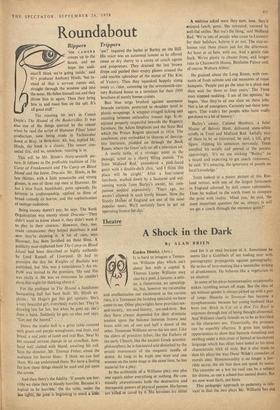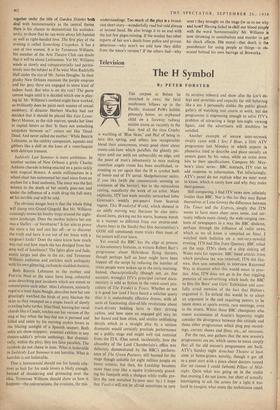Theatre
A Shock in the Dark
BRIEN
By ALAN
Garden District. (Arts.)
IT is hard to imagine a Tennes- see Williams play which isn't about Sex with a capital S. Thomas Lanier Williams may also be a poet, a farceur, a satir- ist, a rhetorician, an apocalyp- tic, but, however we rationalise and intellectualise our excitement as the curtain rises, it is Tennessee the bedding specialist we have come to see. Other playwrights have provided sex- and-society, sex-and-history, sex-and-love. But they have always depended for their dramatic tension upon the balance between brawn and brain with sex of one and half a dozen of the other. Tennessee Williams serves his sex neat. Like the elders of primitive tribes, like the Fathers of the early Church, like the ancient Greek scientist- philosophers, he is fascinated and disturbed by the erratic movements of the magnetic needle of desire. As long as he traps one man and one woman on the same stage at the same time, he has material for a play.
In the arithmetic of a Williams play, one plus one equals either everything or nothing. He con- tinually overestimates both the destructive and therapeutic powers of physical passion. His heroes are killed or cured by it.'His heroines are either mad for it or mad because of it. Sometimes he seems like a Goebbels of sex boiling over with pornographic propaganda against pornography. He writes of love-making like a teetotaller writing of drunkenness. He behaves like a vegetarian in an abattoir.
In some of his plays homosexuality occasionally makes rumbling noises off stage. But the idea of sex without gender is always picked up with a pair of tongs. Blanche in Streetcar has become a nymphomaniac because her young husband likes boys too. Brick in Cat on a Hot Tin Roof is impotent through fear of being thought abnormal. And Williams clearly intends us to be as horrified as his characters are. Theatrically, the pretence can be superbly effective. It gives him, endless opportunities to show that hysteria mounting and swelling under a thin crust of formal or incoherent language which has often been noted as his most characteristic trick of style. But it also tends to date his plays the way Oscar Wilde's comedies of morals date. Homosexuality is no longer a hor- rible secret, the sin that dare not speak its name. The catamite on a hot tin roof can be a subject for drama, as can 'a school-bus named desire. But we now want facts, not hints.
This pedagogic approach to pederasty is rele- vant in that the two plays Mr. Williams has put together under the title of Garden District both deal with homosexuality as the central theine. Here is his chance to demonstrate his ambidex- terity, to show that he can write about left-handed as well as right-handed love. The first play of the evening is called Something Unspoken. It has a cast of two women. It is by Tennessee Williams.
No member of the Arts Theatre Club can doubt that it will be about Lesbianism. Yet Mr. Williams winds as slowly and conspiratorially and porten- tously into the subject as if he were Miss Radclyffe Hall under the eye of Mr. James Douglas. In their plushy New Orleans mansion the purple empress and her grey slave are engaged in some kind of indoor hunt. But who is on the run? The game cannot begin until it is decided which one is play- ing Id. Mr. Williams's method might have worked, so brilliantly does he paint each nuance of sexual snobbery, if director Herbert Machiz had not decided that it should be played like East Lynne. Beryl Measor, as the rich matron, speaks her lines in capital letters so that 'Is there not something unspoken between us?' comes out like 'Dead. Dead. And never called me mother.' While Beatrix Lehmann, as the rabbity companion, squeaks and gibbers like a doll on the knee of a ventriloquist with delirium tremens.
Suddenly Last Summer is more ambitious. In another section of New Orleans a grisly Charles Addams charade is being enacted on a patio sickly with tropical flowers. A senile millionairess in a wheel-chair has summoned her mad niece from an asylum for a final audience, The niece was the last witness to the death of her saintly poet-son and under the influence of a truth drug the full story of his terrible end will be told.
The obvious danger here is that the whole thing will slump into Grand Gingold. But Mr. Williams cunningly strews his booby-traps around the night- mare landscape. Does the mother believe her son was a Shelley—or Swinburne? Is her aim to prove the niece a liar and cast her off—or to discover the truth and have it cut out of her brain with a surgeon's knife? Does the niece know how much was real and how much she has dredged from her own well of loneliness? The lights glow and fade, music surges and dies in the air, and Tennessee Williams embalms and enriches each ambiguity with his own glittering, carbuncle-studded rhetoric.
Both Beatrix Lehmann as the mother and Patricia Neal as the niece have long, colourful arias describing past incidents which are meant to counterpoint each other. Miss Lehmann, sinisterly regal as a mad Anna Neagle, describes how her son gloatingly watched the birds of prey blacken the skies as they swooped on a tropic beach of slowly crawling baby turtles. Miss Neal, bowing her vocal chords like a Casals, retches out her version of the stag at bay when the boy-fed son is pursued and killed and eaten by his starving urchin lovers in the blazing sunlight of a Spanish seaport. Both solos are show-stoppers: essential exhibits in any theatre-addict's private anthology. But dramati- cally, within the play, they are false parallels. The symbols do not chime in tune. What is believable in Suddenly Last Summer is not horrible. What is horrible is not believable.
That a homosexual should use his female rela- tives as bait for his male lovers is likely enough. Instead of shuddering and grimacing over the idea, Tennessee Williams should show us how it happens—the conversations, the evasions, the mis- understandings. Too much of the play is a broad- cast short story—wonderfully read but told always at second hand. He also brings it to an end with the last few pages missing. If the mother has other reports of her son's death from police and private detectives—why aren't we told how they differ from the niece's version? If the others lied—why aren't they brought on the stage for us to see why and how? Having failed to chill our blood simply with the word 'homosexuality' Mr. Williams is now throwing in cannibalism and murder to get his shock effects. His moral—that death is the punishment for using people as things—is ob- scured behind his own barrage of fireworks.



































 Previous page
Previous page